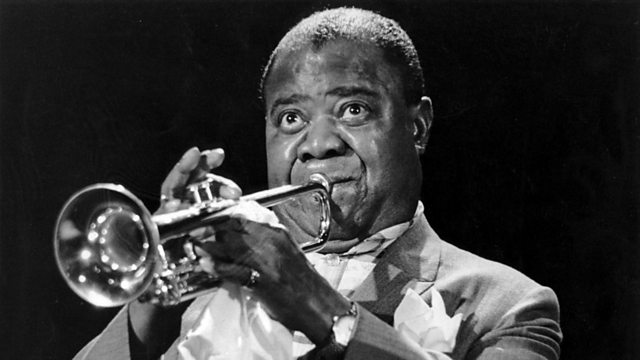Cold War in Full Swing - Louis Armstrong in the GDR
Kevin Le Gendre discovers how Louis Armstrong came to play jazz in communist East Germany during the Cold War, when previously a passion for the music could land you in prison.
Jazz and communist East Germany seem unlikely bedfellows. Yet in 1965 Louis Armstrong became the first American entertainer to play jazz there at the height of the Cold War. East Germans celebrated Armstrong, and his visit became a propaganda victory for East Germany, helping it to boost its reputation in the wake of its oppressive government building the Berlin Wall in 1961. On his brief and only tour through East Germany Armstrong played to packed houses. His popularity surprised the authorities very much considering not one record of him was available before 1965 and your passion for the music could land you in prison. Kevin Le Gendre peeks through the former Iron Curtain to discover the dangers jazz lovers faced to pave the way for these legendary concerts to happen while tracing the tour. He speaks to jazz journalist Karlheinz Drechsel who first risked his career for jazz but then, amazingly, had the privilege to accompany Louis Armstrong on the tour and announce his concerts. He tells Kevin what it was like meeting Louis Armstrong and seeing beyond the smile and laughter that Louis Armstrong was famous for. Armstrong not only had to navigate political sensitivities on the Cold War front between East and West, but also on the home front in the US, when questioned about the Civil Rights Movement, which was at its peak. The tour left a big impression on both sides. Armstrong was very taken by the enthusiastic welcome he received and East Germany, far from the authorities’ intentions, developed a Free Jazz scene that became an unexpected export hit.
Speakers include the journalists Karlheinz Drechsel, Siegfried Schmidt-Joos and Leslie Collitt; the jazz fan Volker Stiehler; the authors Ricky Riccardi and Stephan Schulz; pianist Ulrich Gumpert; and Roland Trisch, who worked at East Germany’s Artists Agency, which enabled Louis Armstrong’s tour.
Archive material of the Selma to Montgomery march in Alabama on 7 March 1965 is courtesy of the Robert H Jackson Center.
Producer: Sabine Schereck
Podcast
-
![]()
The Radio 3 Documentary
Exploring different aspects of history, science, philosophy and the arts.


